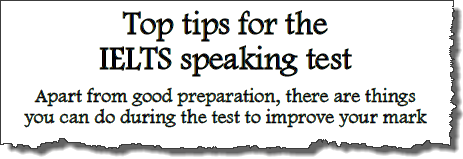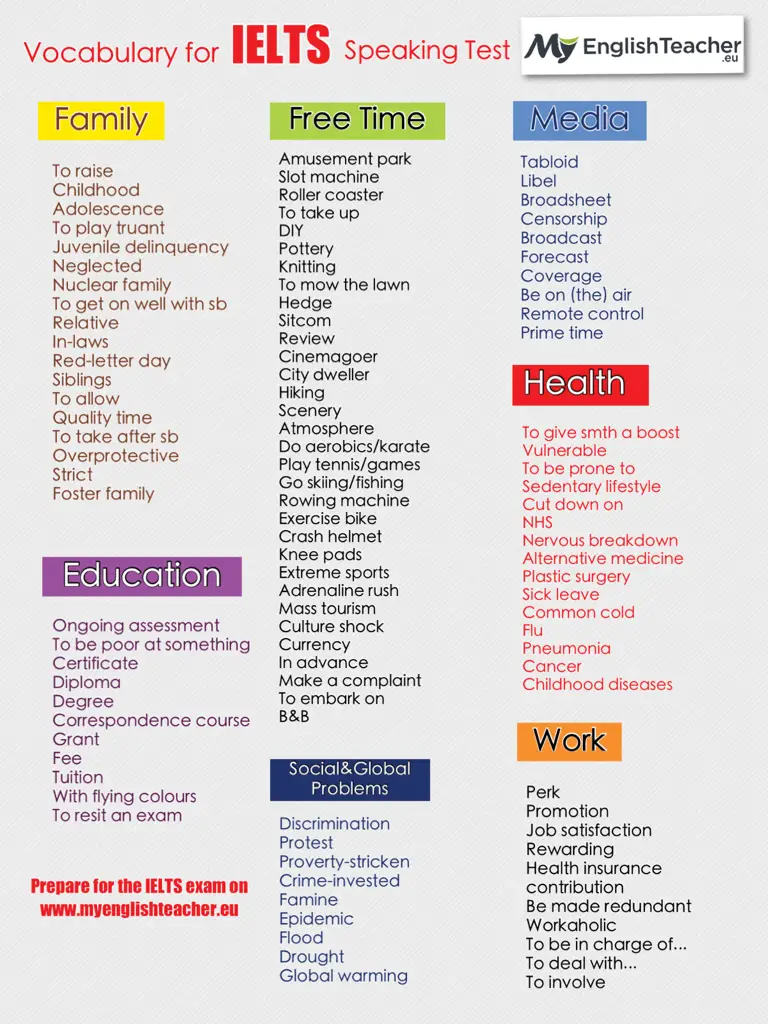
IELTS Speaking Test Vocabulary and Conversation Fillers
 I for Imaginative
E for Excellent
L for Laid-back
T for Tuned-in
S for Smart.
Look at each word above and see how many SYNONYMS (words with the same meaning) can you think of?
Not many? It’s time to learn some new words and to revise the old ones. By the way, ’revise’ has a synonym I love: BRUSH UP. When I hear this word, I always visualize a large brush scrubbing my brain cells.
OK, let me give you a few examples:
I for Imaginative
E for Excellent
L for Laid-back
T for Tuned-in
S for Smart.
Look at each word above and see how many SYNONYMS (words with the same meaning) can you think of?
Not many? It’s time to learn some new words and to revise the old ones. By the way, ’revise’ has a synonym I love: BRUSH UP. When I hear this word, I always visualize a large brush scrubbing my brain cells.
OK, let me give you a few examples:
Why are we talking about synonyms? Because they are extremely important for you to express yourself fluently. When your MIND GOES BLANK (you suddenly forget something you knew) and you can’t remember a word, it is HANDY (useful) to know a list of other words that you can choose from. Also, you can use synonyms to avoid repetition. A nice job, a nice lunch, a nice car, a nice woman etc.- it just sounds unimaginative and perhaps even uneducated if you speak like this. To get a higher score in the exam, you’ll have to learn to PARAPHRASE (to express the same idea with different words). Another way to maximize your learning is to make your own selection of the words YOU would like to memorize. Have you ever learnt a long list of words for a school test, only to forget all of them once the test was over? That was because you had no choice in which words you wanted to learn. Real learning only happens when you yourself are the motivation behind it. So, choose the words you would like to use in the future and focus on them. No need to waste time and energy with long, meaningless lists- make the list shorter if needed, but more interesting to you. It’s also a good idea to group the words and expressions you want to learn into topics. It will help you create a CONTEXT (a setting) where vocabulary becomes more meaningful and memorable to you. And this is what we are going to do now. Below you can find groups of words that will COME IN HANDY (prove to be useful) when preparing for the IELTS exam and IELTS Speaking Test. If you can, try to memorize whole sentences- they will just pop into your mind when you need them. The words you’ll find are not the typical, boring ones you would usually see in a similar compilation. I have chosen them to give you the chance to SPICE UP (make more interesting) your active vocabulary and impress the examiners. CONVERSATION FILLERS Use filters to give yourself time to think before you speak. This will make you sound much more fluent. Er… let me think…
- imaginative, creative, inventive, original
- excellent, great, outstanding, first-rate
- laid-back, relaxed, lax, easy-going
- tuned-in, learned, informed, knowledgeable
- smart, bright, intelligent, sharp
- What do you think are the most common causes of road accidents?
- Er… let me think… I would say there are two main causes…
- Is listening to the radio more beneficial for children than watching TV?
- Hmm… that’s a good question. I guess it is, because…
- Why do teenagers love texting their friends?
- Actually… I’ve never really thought about it… It might be, because they…
- Where do you see yourself in ten years’ time?
- Umm… Where do I see myself in ten years’ time?… Maybe, I will…
- Would you give up your car and cycle to work?
- Well, you know… I work quite far from home…
- Excuse me, can you repeat the question, please? / I beg your pardon?
- Sorry, what do you mean by…?
- Could you say that again, please?
- I’m afraid I don’t understand what you mean by….
- I’m not sure I can follow you. Could you be more specific, please?
- Sorry, I didn’t get your point. Could you put it differently, please?
- What I mean is… (paraphrase what you’ve said)
- I just want to say that… (paraphrase what you’ve said)
- Sorry, let me explain.
- Sorry, let me put it differently.
